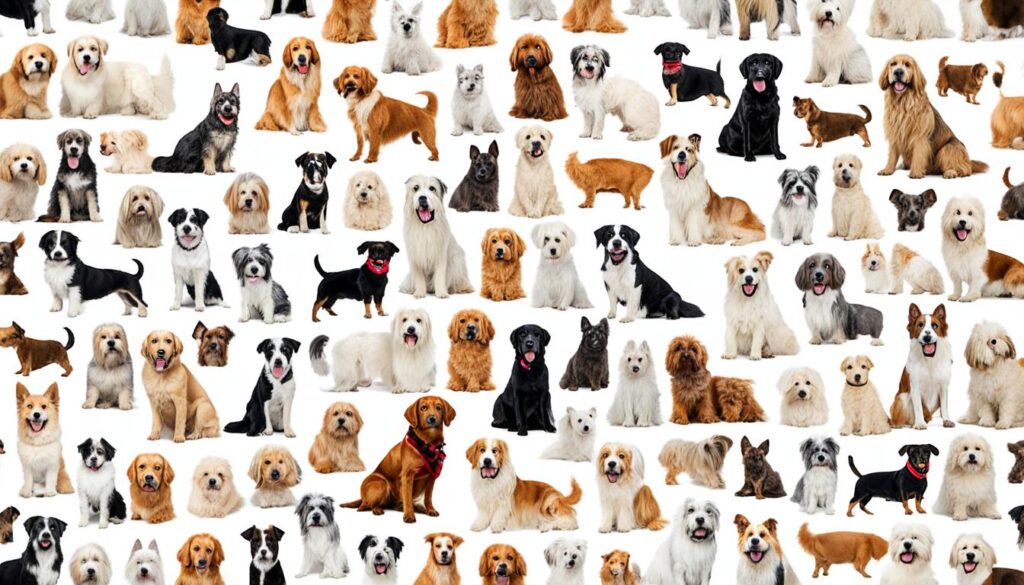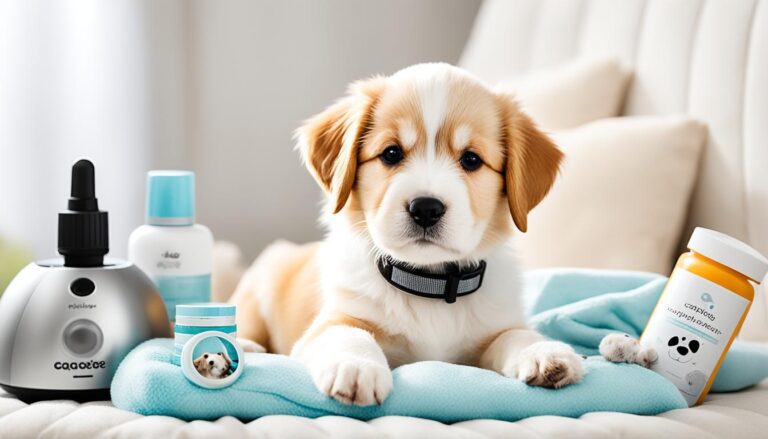Finding a Quite Hypoallergenic Puppy for You
When searching for a hypoallergenic puppy, one of the key factors to consider is finding a breed that is quite hypoallergenic and suitable for individuals with allergies. These dogs, also known as non-shedding dogs or hypoallergenic dogs, produce fewer allergens, making them a great choice for allergy sufferers.
In the United States, there are over 15 hairless and low-shedding hypoallergenic dog breeds, providing a wide range of options for people with allergies. Some of the best hypoallergenic dog breeds include Affenpinscher, Basenji, Bedlington Terrier, Bichon Frise, Chinese Crested, Havanese, Irish Water Spaniel, Kerry Blue Terrier, Komondor, Poodle, Portuguese Water Dog, Puli, Giant Schnauzer, Shih Tzu, Wire Fox Terrier, and Yorkshire Terrier. These breeds have coats that shed minimally and produce less dander, making them suitable for individuals with mild allergies.
It’s important to note that although these dogs are hypoallergenic, they are not completely allergen-free. Each person’s allergies may vary, so it’s essential to spend time with the dog to determine if any allergic reactions occur.
Key Takeaways:
- Non-shedding dogs, also known as hypoallergenic dogs, are suitable for allergy sufferers.
- There are more than 15 hairless and low-shedding hypoallergenic dog breeds in the US.
- Hypoallergenic breeds, such as Affenpinscher, Bichon Frise, and Poodle, shed minimally and produce less dander.
- Although hypoallergenic, these dogs may still cause allergic reactions in some individuals.
- Spending time with the dog before making a decision can help gauge any allergic reactions.
Now that you have an understanding of the benefits and considerations of hypoallergenic dog breeds, you can make an informed decision when searching for your perfect furry companion. Remember to prioritize your allergies and spend time with the dog to ensure compatibility. Your new hypoallergenic puppy can bring joy and companionship without triggering allergic reactions.
Are Hypoallergenic Dogs Completely Allergen-Free?
It’s a common misconception that hypoallergenic dogs are completely allergen-free. While hypoallergenic breeds produce fewer allergens, there are no completely allergen-free dogs. Breeders label certain breeds as hypoallergenic because they are relatively unlikely to cause an allergic reaction in individuals with allergies. However, it’s important to remember that each person’s allergies may vary, and it’s recommended to spend time with a specific breed to gauge any allergic reactions.
Hypoallergenic dogs have coats that shed less or have hair that is less likely to trigger allergies. These breeds can be a great choice for people with allergies, but it’s crucial to keep in mind that individual reactions may still occur.
The Lowdown on Hypoallergenic Dog Breeds
Some hypoallergenic dog breeds include:
- Maltese
- Poodle
- Bichon Frise
- Shih Tzu
- Yorkshire Terrier
- Schnauzer
While these breeds have characteristics that make them less likely to cause allergies, it’s important to note that individual experiences may vary. Spending time with the specific breed you’re interested in is essential to ensure compatibility and minimize allergic reactions.
Ingeniously designed by nature, hypoallergenic dogs offer allergy sufferers the opportunity to enjoy the companionship of a canine friend without compromising their health.

| Breed | Coat | Allergen Production |
|---|---|---|
| Maltese | Long, silky, and hypoallergenic | Low |
| Poodle | Curly or corded and hypoallergenic | Low |
| Bichon Frise | Curly and hypoallergenic | Low |
| Shih Tzu | Long and hypoallergenic | Low |
| Yorkshire Terrier | Silky and hypoallergenic | Low |
| Schnauzer | Wire-haired or soft and hypoallergenic | Low |
How Can I Reduce Allergy Symptoms From My Dog?
If you have a dog and experience allergy symptoms, there are steps you can take to reduce those symptoms. By following these strategies, you can enjoy the company of your furry companion while managing your allergies effectively.
Regular Cleaning and Maintenance
- Wash Your Pet’s Bedding: Regularly wash your pet’s bedding in hot water to eliminate allergens that may accumulate.
- Change Air Filters: Replace air filters frequently to reduce the presence of allergens in your home.
- Use a HEPA Air Cleaner: Invest in a high-efficiency HEPA air cleaner to filter out allergens from the air.
- Create an “Allergy-Free” Zone: Designate a specific area in your home, such as a bedroom, as an “allergy-free” zone where your dog is not allowed.
Grooming and Care
- Use an Anti-Allergenic Shampoo: Groom your dog regularly using an anti-allergenic shampoo to minimize allergens on their coat.
- Brush Frequently: Brushing your dog’s fur frequently can help remove loose hair and dander, reducing allergens in your home.
Consider Allergy Shots or Medications
If your allergy symptoms persist, consider consulting with a healthcare professional about allergy shots or medications that can help alleviate your symptoms.
Finding a Hypoallergenic Puppy
If you’re in search of a hypoallergenic puppy, sites like Petfinder offer a wide selection of hypoallergenic dog breeds for adoption. By choosing a hypoallergenic breed, you can minimize the risk of allergies and find a furry friend that suits your lifestyle. Some of the best hypoallergenic dog breeds include:
| Breed | Description |
|---|---|
| Affenpinscher | Small, hypoallergenic breed known for its curly, wiry coat. |
| Bedlington Terrier | Gentle and affectionate breed with a woolly, hypoallergenic coat. |
| Poodle | Highly intelligent and versatile breed available in various sizes and hypoallergenic coat types. |
| Shih Tzu | Small breed with a long, flowing coat that requires regular grooming but is hypoallergenic. |
By combining these strategies with the right hypoallergenic dog breed, you can minimize allergens in your home and enjoy the companionship of a hypoallergenic puppy without the discomfort of allergy symptoms.
Conclusion
Finding a hypoallergenic puppy can be a life-changing experience for individuals with allergies. While it’s important to note that no dog is completely allergen-free, hypoallergenic breeds offer a solution for those seeking furry companionship without constant allergy symptoms. These breeds have coats that shed less and produce fewer allergens, making them suitable options for allergy sufferers.
By considering hypoallergenic dog breeds and implementing measures to minimize allergens in your home, you can enjoy the love and companionship of a hypoallergenic puppy. Whether you opt for a Bichon Frise, Poodle, Shih Tzu, or any other hypoallergenic breed, adopting a hypoallergenic puppy can bring immeasurable joy and comfort to your life.
Start your search today and find the perfect hypoallergenic puppy that aligns with your lifestyle and meets your allergy needs. With hypoallergenic puppies, you can experience the joy of having a canine companion without the constant worry of allergic reactions. Embrace the opportunity to welcome a hypoallergenic dog into your life and enjoy all the benefits that come with it.
FAQ
What are some hypoallergenic dog breeds?
Some hypoallergenic dog breeds include Affenpinscher, Basenji, Bedlington Terrier, Bichon Frise, Chinese Crested, Havanese, Irish Water Spaniel, Kerry Blue Terrier, Komondor, Poodle, Portuguese Water Dog, Puli, Giant Schnauzer, Shih Tzu, Wire Fox Terrier, and Yorkshire Terrier.
Are hypoallergenic dogs completely allergen-free?
No, hypoallergenic dogs are not completely allergen-free. While they produce fewer allergens, there are no completely allergen-free dogs. Each person’s allergies may vary, and it is recommended to spend time with a specific breed to determine if any allergic reactions occur.
How can I reduce allergy symptoms from my dog?
To reduce allergy symptoms from your dog, you can regularly wash their bedding, change air filters, use a high-efficiency HEPA air cleaner, create an “allergy-free” zone, groom your dog with an anti-allergenic shampoo, brush them frequently, consider allergy shots or medications, and minimize allergens in your home.







